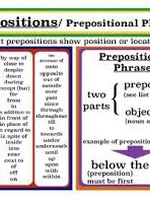
- 06.09.2018
- vlad.pruha.web
- 1
Sometimes the answers to those questions take more than one word. Often those phrases are prepositional phrases.
Which one: The flower in the vase is a peony.
What kind: The umbrella with the polka-dots is Mary Anne's.
Where: We will be going to the movies.
When: My lunch period is after science.
How: You are walking on your tiptoes.
- Definition:
- A phrase is a group of words working together that does not have both a subject and a verb. Phrases usually act as a single part of speech. (We will get to that part later.)
A preposition is a word that shows the relationship between a word in the sentence and the word that is the object of the preposition.
In the previous examples:
In shows the relationship between the flower and the vase.
With shows the relationship between the umbrella and the polka-dots
To shows the relationship between where we are going and the movies.
After shows the relationship between our lunch and science class.
On shows the relationship between how we are walking and our tiptoes.
- Definition:
- The object of the preposition is the noun following the preposition that the preposition is relating to something in the sentence.
- Hint:
- To find the object of the preposition ask "What?" after the preposition.
The flower in the vase is a peony.
You found in - ask "In what?" Answer - vase. Try it with the other examples.
- Definition:
- A prepositional phrase is the preposition, the object of the preposition, and all the modifiers between the two.
in (preposition) the vase (object)
with (preposition) the polka-dots (object)
to (preposition) the movies (object)
after (preposition) science class (object)
on (preposition) your tiptoes (object)
Some teachers have their students memorize a list of common prepositions. That can be confusing because sometimes those same words act as adverbs. It is better to understand how they show a relationship.
| Some Common Prepositions | |
|---|---|
| Prepositions of time: | after, around, at, before, between, during, from, on, until, at, in, from, since, for, during, within |
| Prepositions of place: | above, across, against, along, among, around, at, behind, below, beneath, beside, between, beyond, by, down, in, inside, into, near, off, on, opposite, out, over, past, through, to, toward, under, underneath |
| Prepositions of direction/movement : | at, for, on, to, in, into, onto, between |
| Prepositions of manner: | by, on, in, like, with |
| Other types of prepositions: | by, with , of, for, by, like, as |
Do you need to know what categories they fit into? Not really. It's just a way to sort them. Remembering time, place, direction, and manner might help you remember what prepositions do.
- Hint:
- The word to is often a preposition, but it is just as often part of an infinitive verb. If the word after to is a verb, to is not a preposition.
Preposition: I want to go to Florida for vacation.
Infinitive Verb: I want to go to Florida for vacation.
- Hint:
- Think of prepositions as arrows.
→ to, at, for...
← from, next to...
↔ with, between...
↑ above, on...
↓ in, inside, under, below...
- Hint:
- One of the best ways to understand prepositional phrases is to learn how to diagram sentences.
Reviews 1
- 27.02.2023 20:11Hello Dear,
How are you? I hope all is well,My name is elisabeth andrew,i saw your profile at(www.engvid.com) became interested in you for a friendship, I would like to know more about you.
Please contact me through my private email elisabethandrew@aol.com so i can give you my pictures for you to know who i am. I believe we can move from here, it will be a pleasure to know you sincerely!
Please I am waiting for your response!
